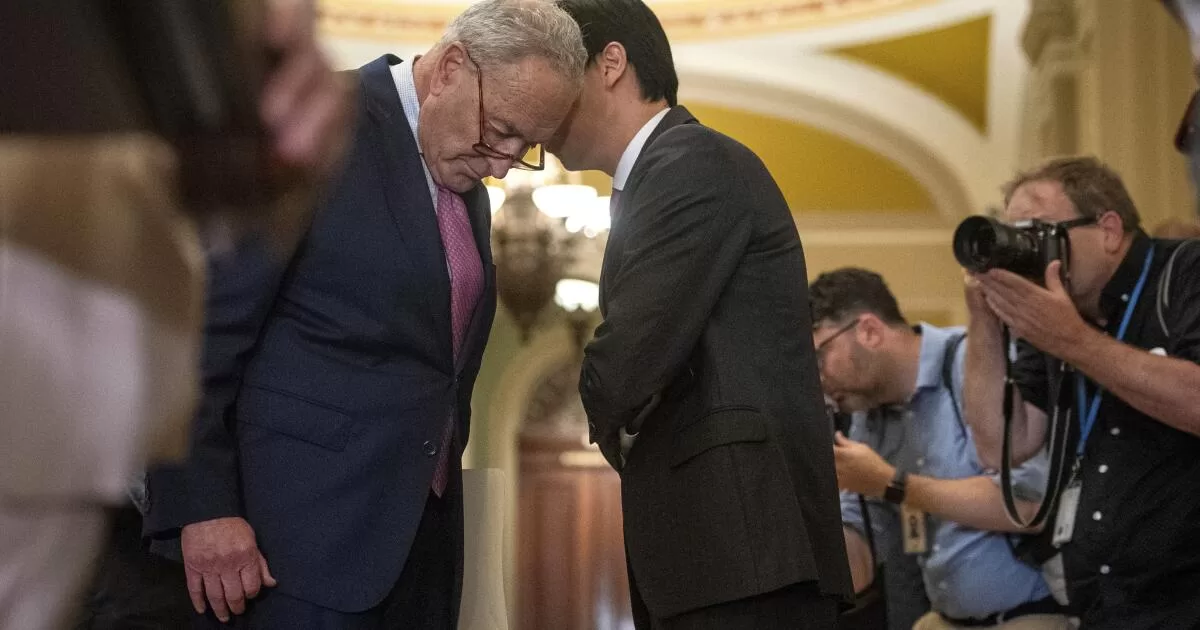Democratic lawmakers have tried all manner of responses to their Biden dilemma — some evasive, some creative.
The Tuesday walkback from Rep. Jerry Nadler of New York, who had called for a new candidate only two days earlier: Whether I have concerns or not is beside the point.
The restatement of fact from Rep. Ro Khanna of Fremont during a televised Washington Post interview: The reality is that the president has said that he is running.
The optimistic quip from Rep. Lou Correa of Santa Ana: 80 is the new 60.
A predicted tsunami of Capitol Hill Democrats calling for President Biden to withdraw from his reelection bid has turned into a trickle of public dissent, held back by a thin seawall of support. Many lawmakers have dodged reporters, talked around the question or, when pressed, said what they needed to say in hopes of moving on from concerns about Biden’s decline or whether he is equipped to defeat former President Trump.
Their answers say as much about their own political motivations — and the imperative politicians place on self-preservation — as they do about Biden. Polls show majorities of voters want Biden to step aside and he has fallen further behind Trump in many head-to-head polls, including an AARP poll released Tuesday that showed him 5 percentage points down in Wisconsin, a must-win state.
“It’s driven by caution, political survival instincts. A lot of Democrats don’t want to be out on a limb,” said Tim Miller, who worked on communications strategy at the highest levels of Republican politics before becoming a vocal Trump critic and leaving the party.
“There’s a lot of loud voices that are going to yell at you on social media and the phones in your office,” he added, arguing that those voices do not represent the consensus among voters.
Behind the scenes, elected Democrats are deeply worried about Biden’s declining stamina and his ability to defeat Trump, according to congressional aides and others who have spoken with them, along with public comments of some lawmakers. The mood at a meeting of House Democrats on Tuesday at the Democratic National Committee’s headquarters was described as “sad and frustrated” by a person familiar with the closed-door meeting who would only describe it anonymously. Senate Democrats held a similar gathering later in the day.
But for now, at least, Biden appears to have avoided the kind of mass public defections that would force his hand. He could face a new round of doubts if fresh polls show him sinking further or he stumbles during a public event like his planned press conference on Thursday. But the longer he buys time, the less likely it is he will leave the race.
Rep. Alexandria Ocasio-Cortez, the New York Democrat and leading progressive voice, appeared to be reckoning with that reality late Monday as she tried to close the book with yet another sort of semi-endorsement that evaded the question of whether he should remain in the race. “Joe Biden is our nominee. He is not leaving this race,” she told reporters. “He is in this race and I support him.”
Jim Manley, who spent decades in the Senate devising communication strategies for Democratic leaders, said the reactions have surprised him, especially the unwillingness of many House Democrats to speak out when they normally rush for the cameras.
“The president feels correctly that time is his friend. Many members are unwilling to confront this. They’re just stalling for time,” he said.
But there’s also a problem of collective action. Lawmakers such as Nadler and Sen. Mark Warner of Virginia stepped back from their calls for a new candidate after they failed to rally others. One former Republican leadership aide said the party’s leaders are waiting for rank-and-file members to act while rank-and-file members are waiting on their leaders.
“The president has probably benefited from the lack of a really organized opposition,” said John Lawrence, who spent 38 years as a Democratic aide, eight of them as former Speaker Nancy Pelosi’s chief of staff.
But it’s also not the nature of members of Congress, who tend to value their own reelection more than the presidency or even which party controls the House and Senate, said Lawrence, author of “Arc of Power: Inside Nancy Pelosi’s Speakership, 2005–2010.” Going against an incumbent president, stirring chaos at the top of the ticket or shaking up an institution all cut against those goals, he said.
“Relatively few revolutions are launched by people in power,” he said. “That’s not the nature of revolutions.”
Republicans have been tested by Trump many more times than Democrats as their nominee has faced two impeachments, multiple indictments, a conviction, calls to suspend the Constitution and any number of startling statements that began before he became president in 2017.
“I don’t want to compare thoughts about a candidate’s age to not wanting to speak out about a candidate’s racism or bigotry or lies or conspiracy mongering,” Miller said. “The motivations come form the same place, which is political survival and not wanting to rock the boat.”
Times staff writer Faith Pinho contributed to this report.
